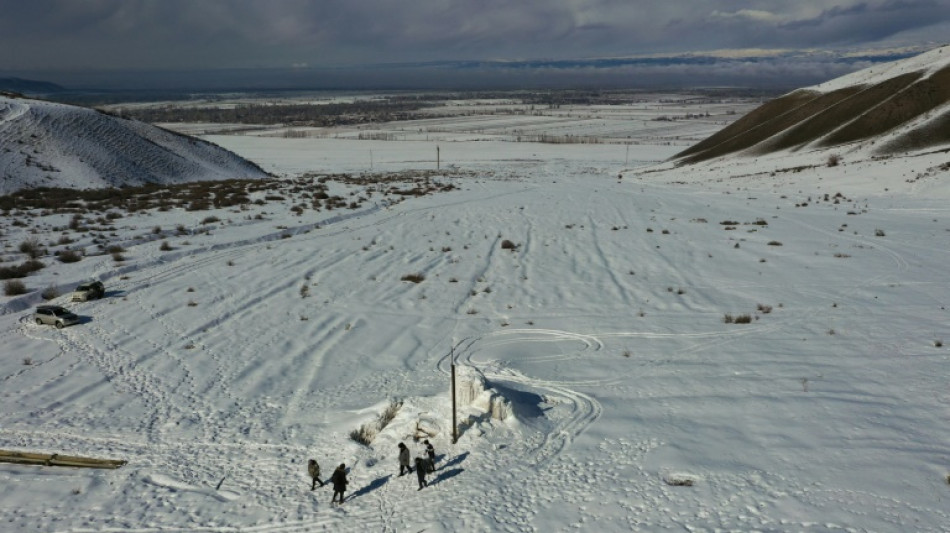
-
 Miller guides South Africa to 187-7 against India
Miller guides South Africa to 187-7 against India
-
Scotland boss 'proud' of comeback Six Nations win over Wales

-
 Iranian students rally for second day as fears of war with US mount
Iranian students rally for second day as fears of war with US mount
-
US Secret Service kills man trying to access Trump Florida estate

-
 Coventry 'let the Games do their magic': former IOC executives
Coventry 'let the Games do their magic': former IOC executives
-
Cayenne Turbo Electric 2026

-
 Sri Lanka have to qualify 'the hard way' after England drubbing
Sri Lanka have to qualify 'the hard way' after England drubbing
-
Doris says Six Nations rout of England is sparking Irish 'belief'

-
 Thousands of pilgrims visit remains of St Francis
Thousands of pilgrims visit remains of St Francis
-
Emotional Gu makes history with Olympic freeski halfpipe gold

-
 Impressive Del Toro takes statement victory in UAE
Impressive Del Toro takes statement victory in UAE
-
Gu wins triumphant gold of Milan-Cortina Olympics before ice hockey finale

-
 England rout Sri Lanka for 95 to win Super Eights opener
England rout Sri Lanka for 95 to win Super Eights opener
-
Underhill tells struggling England to maintain Six Nations 'trust' as Italy await

-
 Alfa Tonale 2026: With a new look
Alfa Tonale 2026: With a new look
-
BMW 7 Series and i7: facelift in 2026

-
 Eileen Gu makes history with Olympic freeski halfpipe gold
Eileen Gu makes history with Olympic freeski halfpipe gold
-
Eileen Gu makes history with Olympic halfpipe gold

-
 Morocco flood evacuees mark muted Ramadan away from home
Morocco flood evacuees mark muted Ramadan away from home
-
Lucid Gravity 2026: Test report

-
 Sri Lanka restrict England to 146-9 in T20 World Cup Super Eights
Sri Lanka restrict England to 146-9 in T20 World Cup Super Eights
-
West Indies wary of Zimbabwe's 'X-factor' quick Muzarabani

-
 Bentley: Visions for 2026
Bentley: Visions for 2026
-
Eileen Gu wins Olympic gold in women's freeski halfpipe

-
 First 'dispersed' Winter Olympics a success -- and snow helped
First 'dispersed' Winter Olympics a success -- and snow helped
-
Six stand-out moments from the 2026 Winter Olympics

-
 Andrew's arrest hands King Charles fresh royal crisis
Andrew's arrest hands King Charles fresh royal crisis
-
Afghans mourn villagers killed in Pakistani strikes

-
 Jeeno Thitikul brings home LPGA win in Thailand
Jeeno Thitikul brings home LPGA win in Thailand
-
Snowboard champion Karl '99 percent' sure parallel giant slalom will stay in Olympics

-
 Greenland does not need US hospital ship: Danish minister
Greenland does not need US hospital ship: Danish minister
-
Russian missile barrage hits energy, railways across Ukraine

-
 Ka Ying Rising makes Hong Kong racing history with 18th win
Ka Ying Rising makes Hong Kong racing history with 18th win
-
St Francis relics go on public show for first time in Italy

-
 Deflated Australia face tough questions after T20 World Cup flop
Deflated Australia face tough questions after T20 World Cup flop
-
Brazil's Lula urges Trump to treat all countries equally

-
 Knicks rally to down Rockets as Pistons, Spurs roll on
Knicks rally to down Rockets as Pistons, Spurs roll on
-
Brumbies end 26-year jinx with thrashing of Crusaders

-
 Pakistan launches deadly strikes in Afghanistan
Pakistan launches deadly strikes in Afghanistan
-
Son's LAFC defeats Messi and Miami in MLS season opener

-
 Korda to face Paul in all-American Delray Beach final
Korda to face Paul in all-American Delray Beach final
-
Vikings receiver Rondale Moore dies at 25

-
 Copper, a coveted metal boosting miners
Copper, a coveted metal boosting miners
-
Indigenous protesters occupy Cargill port terminal in Brazil

-
 Four lives changed by four years of Russia-Ukraine war
Four lives changed by four years of Russia-Ukraine war
-
AI agent invasion has people trying to pick winners

-
 'Hamnet' eyes BAFTAs glory over 'One Battle', 'Sinners'
'Hamnet' eyes BAFTAs glory over 'One Battle', 'Sinners'
-
Cron laments errors after Force crash to Blues in Super Rugby

-
 The Japanese snowball fight game vying to be an Olympic sport
The Japanese snowball fight game vying to be an Olympic sport
-
'Solar sheep' help rural Australia go green, one panel at a time


Artificial glaciers stave off drought in Kyrgyzstan
In the Tian-Shan mountains of Kyrgyzstan, villagers have made an artificial glacier to provide water for their drought-hit farms.
Standing on the ice hillock, farmer Erkinbek Kaldanov said he was optimistic about harnessing nature to counteract climate change.
"We won't have any more problems with water," said the farmer, who was worried for his sheep last year after some unusual temperature spikes.
"When the glacier melts, there will be enough water for the livestock and to water the land in Syn-Tash," the surrounding district, he said.
The glacier currently measures five metres (16 feet) high and about 20 metres long. At the height of winter it was 12 metres tall.
Local residents made it over a period of two weeks in autumn by re-directing water from the peaks of Tian-Shan, which tower more than 4,000 metres high in northern Kyrgyzstan.
Kaldanov and others are being forced to adapt since natural glaciers in Central Asia -- the main water source for the region -- are slowly disappearing due to global heating.
A 2023 study in the journal Science predicted that the acceleration in the melting of the glaciers would peak only between 2035 and 2055.
The lack of snow, also due to higher temperatures, does not allow them to regenerate.
- 'Less and less water' -
The extent of the problem can be seen in satellite images of Central Asia and in the regular warnings issued by the United Nations.
The problem has a knock-on effect on the lowlands of Central Asia, in more arid countries like Kazakhstan, Turkmenistan and Uzbekistan.
This in turn feeds into existing tensions between the different countries, which still share water resources under a complex and obsolete scheme inherited from the Soviet era.
"There is less and less water every year. The water tables are emptying out, the springs are drying up and we have problems with grazing," said Aidos Yzmanaliyev, a spokesman for the Syn-Tash farmers.
Finding solutions is urgent, particularly as farming represents around 10 percent of the fragile Kyrgyz economy and two thirds of its inhabitants live in rural areas.
In the north of Kyrgyzstan, a country accustomed to revolutions and uprisings, the lack of water has already stoked social tensions in previous periods of drought.
"Our main aim is to provide water for livestock since the majority of the 8,400 inhabitants of the Syn-Tash district are farmers," said district chief Maksat Dzholdoshev.
"We expect to create two or three additional artificial glaciers for farmland," he said.
- Simple concept -
The idea and its implementation are relatively simple. Each glacier costs around 550,000 som (around $6,200) to create.
"The water comes from a mountain source three kilometres away through underground piping. It gushes out and freezes, forming a glacier," said Yzmanaliyev.
"Apart from providing water when it melts, the glacier also helps lower the ambient temperature and create humidity.
"(That) helps the surrounding vegetation, which is grazed by cattle from spring to autumn," Yzmanaliyev said.
Artificial glaciers were first created in the Indian Himalayas in 2014 and have gone global -- cropping up in Chile and Switzerland.
In Kyrgyzstan, their introduction was spearheaded by Abdilmalik Egemberdiyev, head of the Kyrgyz association of pasture users.
Egemberdiyev pointed to an additional benefit.
The glaciers allow farmers to keep livestock on spring pastures for longer before sending them to summer pastures, thus slowing soil erosion.
"We now have 24 artificial glaciers around the country and more still to be created," he said.
M.Thompson--AMWN


